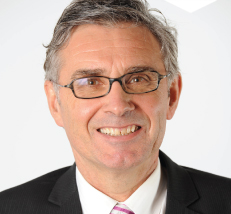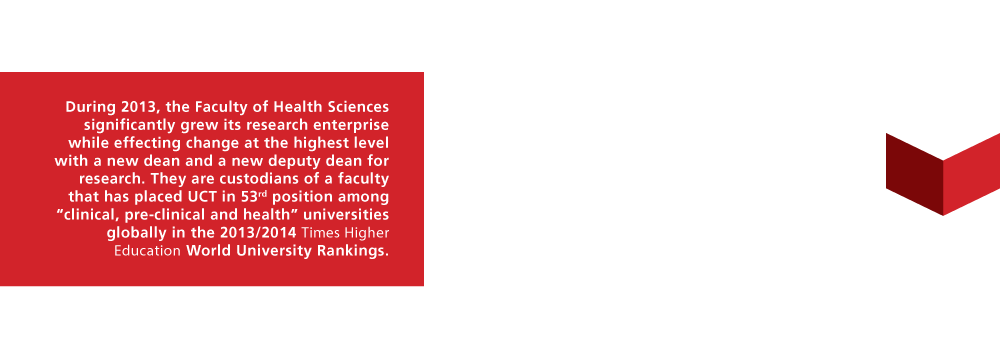 DEAN’S REPORT
DEAN’S REPORT
Professor Wim de Villiers
Our ongoing challenge is to maintain and improve the high quality of our research while building relevant collaborations and growing our income to fund not only relevant studies but the infrastructure to support them efficiently.
The Faculty of Health Sciences makes a vital contribution to UCT’s research income. We signed 747 research contracts in 2013, valued at just under R558 million. This is a 42% increase from 2012 and represents 57% of the university’s income. The faculty receives income from a wide range of national and foreign funders, and it has been encouraging to witness the recent partnering of local medical research funders with major international bodies to support health sciences research in South Africa. The faculty’s research publication output also continued to grow.
These publications arise from all our departments and the numerous research groups spread across them, many promoting interdisciplinarity through cross-departmental interaction. Twenty-four of these groupings are accredited by the University Research Committee (out of UCT’s total of 73), the most recent accreditations being the Lung Infection and Immunity Unit and the HIV Mental Health Research Unit. Eight of these are South African Medical Research Council (MRC) units, which, in alignment with MRC goals, focus increasingly on the health priorities of the country. The MRC also awarded four merit awards to UCT Health Sciences academics in 2013 (see more).
These are not the only recent awards garnered by faculty academics. Professor Valerie Mizrahi, director of the Institute of Infectious Disease and Molecular Medicine (IDM), was awarded the prestigious Christophe Mérieux Prize in 2013 for infectious disease research in developing countries (see p168). Professor Tim Noakes, director of the UCT/MRC Research Unit for Exercise Science and Sports Medicine, received a Lifetime Achievement Award at the National Business Awards in acknowledgement of his expertise in the field of exercise research. Professor Brian Rayner, head of the Division of Nephrology/Hypertension, won the respected 2014 World Hypertension League Award for Notable Achievement in Hypertension, while Professor Karen Sliwa, director of the Hatter Institute for Cardiovascular Research, received the Paul Morawitz Award for her research into cardiovascular prevention, heart failure and the pathophysiology of cardiomyopathy (see more).
Evidence that our researchers are continuing to perform at a high level is also apparent from the 2014 National Research Foundation (NRF) ratings. During this cycle, the faculty grew its NRF A-, B- and C-category ratings to yield a total of 109 rated researchers, which includes the 17 that are held by young researchers in the Y category. UCT increased its number of prestigious A ratings to 35, with health sciences receiving our 12th coveted A rating in Emeritus Professor Robin Wood, director of the Desmond Tutu HIV Centre (see more).
The faculty was home to 119 postdoctoral research fellows during 2013, more than a third of UCT’s 318. This is an increase of 20 fellows from 2012, again reflecting the growth of the research portfolio in health sciences. Between them, our postdoctoral fellows received 188 fellowships, valued at over R22 million. A further reflection of UCT’s efforts to foster successful health researchers is the growth of its Emerging Researcher Programme. During 2013, 150 of the faculty’s academics participated in the programme, compared to six in the first year of the programme 10 years ago. This capacity-building initiative provides research development grants, workshops and mentoring to emerging researchers, strengthening their profiles and preparing them for future research leadership.
In 2013, the faculty was home to around 2000 postgraduate students, roughly a quarter of UCT’s total. PhD candidates made up 360 of these, with 88 honours students and a large contingent of 1 243 master’s students. We also housed 38 occasional postgraduate students and 247 studying for postgraduate diplomas. The faculty is committed to fostering the growth of human research capacity and our postgraduate training is in keeping with national priorities, supporting the South African government’s target of 1 000 new PhD enrolments in health sciences by 2022. A total of 539 of our health sciences postgraduate students received, between them, 809 scholarships, to the value of R37 million. During two graduation ceremonies, we awarded 70 honours, 181 master’s and 53 PhD degrees, as well as 163 postgraduate diplomas, across a wide range of disciplines. This is the highest number of postgraduate degrees and diplomas ever awarded in one academic year by the faculty.
Participation in health research is also encouraged at the undergraduate level, where we hope to inspire students to contribute to knowledge generation and develop research skills. The annual Health Sciences Undergraduate Research Day again successfully engaged students in October 2013. One hundred undergraduate students from across the faculty took part. Twelve oral presentations were delivered, and 25 posters presented. These were selected for inclusion by a committee of senior staff members and subsequently judged by a panel of clinical science, basic science, health and rehabilitation and public health academics.
Following the success of the past year, and the invigoration of changes in leadership and new initiatives, we expect our research enterprise to continue to deliver bigger and better advances in science and health.
Two exciting faculty initiatives that kicked off in 2013 are the Cancer Research Initiative and the UCT Clinical Research Centre (CRC). The aim of the Cancer Research Initiative is to promote translational cancer research by encouraging greater collaboration among basic, clinical, rehabilitative and public health researchers and building research capacity. Early work on the initiative has included conducting a cancer situational analysis, discussions with internal and external role players, cancer seminars and work towards development of a strategic plan. The CRC, on the other hand, aims to provide expertise and support for the design, development, management, analysis and publication of high-quality clinical trials and other studies. This will include support for activities such as project management, regulatory submissions, quality assurance and data management. Support is cross-faculty and initial activity has included presentations and site visits to groups actively engaging in clinical research, facility development, pilot project support, and development of standard operating procedures, guidelines and training material.
Pilot work of both the Cancer Research Initiative and the CRC were funded through the UCT research incentive scheme. The faculty released a call in April 2013 for proposals for novel projects to incentivise research and five awards were granted. The other three were the creation of an evidence-based medicine research support unit, the establishment of a microbiome research platform and the development of a discipline-independent clinical information and experimental data portal.
A second faculty funding initiative, funded by a Vice-Chancellor’s Strategic Award, was the Top Soft-Funded Academic and Research Staff (SFARS) scheme. In this initiative, merit-based awards were offered to SFARS in recognition of the significant role played by this component of our staff. Applications were competitive, with review by an independent committee, and were judged in two categories. In the Associate Professor/Professor category, awards were given to Professor Linda-Gail Bekker (Desmond Tutu HIV Centre), Associate Professor Crick Lund (Department of Psychiatry and Mental Health), Associate Professor Helen McIlleron (Division of Clinical Pharmacology) and Associate Professor Landon Myer (School of Public Health and Family Medicine). In the Lecturer/Senior Lecturer category, these accolades were garnered by Dr Chris Colvin (School of Public Health and Family Medicine) and Associate Professor Thomas Scriba (South African Tuberculosis Vaccine Initiative).
As 2014 progresses, the Faculty of Health Sciences is actively working to support the rapid growth in its research activity and output with enabling infrastructure, administration and governance. We are conducting an analysis of the costs and benefits of research in the faculty to understand better the complex and inter-related sources of income and output so that these can best be supported in the future. We are also striving to broaden our funding base and engage with both local and international funders to understand how our mutual interest in health betterment can be realised optimally.
Following the success of the past year, and the invigoration of changes in leadership and new initiatives, we expect our research enterprise to continue to deliver bigger and better advances in science and health.


